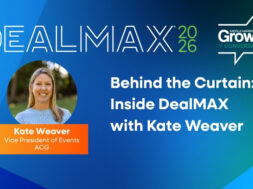Dealmaker Q&A: TSCP on Acquiring DDC Cabinet Technology
Tom St. Geme of Thompson Street Capital Partners shares why they're betting that their new acquisition can deliver a revolutionary technology at a cost-effective price point

When Thompson Street Capital Partners (TSCP) and Cequel III acquired a controlling interest in DDC Cabinet Technology, a manufacturer of patented data center cabinet and cooling solutions, they were excited to partner with a company providing a unique product in a time of ever-growing demand for AI and data tools. Tom St. Geme, director at TSCP, spoke to Middle Market Growth about what drew his firm to DDC Cabinet Technology and how he hopes to expand and scale their offerings in a rapidly growing AI market.
Middle Market Growth: When sourcing the deal, what were you looking for in an investment target, and how did DDC Cabinet Technology fill those requirements?
Tom St. Geme: Partnering with talented founders who have built great businesses, in markets we understand well, where we see untapped potential and an opportunity to help accelerate growth is the foundation for how we invest at TSCP. DDC was a unique situation for us for a number of reasons. First, one of our portfolio companies, TierPoint, a national operator of data centers, had been a user of DDC’s technology for several years leading up to our DDC investment and saw it consistently outperform alternatives when powering higher density workloads. Second, our long-time partner, Jerry Kent, currently the CEO of TierPoint and CEO of his management company Cequel III, had a preexisting relationship with the DDC founders and helped bring the deal to life with his impressive track record that has spanned decades, building technology leaders.
Moreover, like other TSCP technology investments, DDC was led by two highly technical co-founders who spent a decade building an innovative cooling solution that we thought was well-positioned to win in the fast-growing AI computing market. They needed a growth partner to help expand the platform and more quickly commercialize the technology. This combination of deal dynamics aligned nicely with our founder-first approach, in a market we were well-versed in, with growth opportunities we believed we could help the team capitalize on.
MMG: What attracted TSCP to the technology sector initially, and how does this deal fit into your broader investment strategy?
TSG: We frequently talk about finding “hidden champions” when making investments in technology and software at TSCP. These are best-of-breed products that have flown under the radar and are or have the potential to be niche leaders in their category. We’re constantly in search of technology businesses that exhibit these characteristics and of course beyond that, have been drawn to the secular growth, recurring revenue models, strong retention, attractive profitability profiles and asset light nature that can be found across the technology landscape. More simply, technology businesses can scale very well, and tech is an area where we’ve found great businesses and talented entrepreneurs to partner with over the years.
This is a business that we viewed as having a differentiated cooling solution within a huge, rapidly growing market that AI demand is fueling.
As it relates to DDC more specifically, this is a business that we viewed as having a differentiated cooling solution within a huge, rapidly growing market that AI demand is fueling. It’s hard not to see what’s going on with NVIDIA at the moment, and these are the types of high-performance chips sitting inside of DDC’s data center cabinets. DDC’s cabinets use a patented hybrid cooling system that combines air and liquid and is optimized by a proprietary controls software that took more than a decade to design and refine. It’s a highly complex solution that is well-positioned to win in the cooling market for GPU and high-performance computing. We additionally saw clear and actionable growth acceleration opportunities in partnership with Jerry Kent and the Cequel III team to further invest in the core DDC team, to invest in a more robust go-to-market engine that would get the product further into the market, to help scale manufacturing operations and to continue advancing product development—all things that we’re frequently supporting when partnering with technology and software companies at TSCP.
MMG: What are some industry headwinds you’re watching, and how do you plan to drive growth despite those?
TSG: I think we can agree that we’re in the midst of a unique moment for AI. On the data center side alone, in the back half of 2023, we saw a 7x increase in data center power construction relative to the 2020-2021 average reflecting the impact AI workloads are having on GPU/high-performance computing needs. That said, this is highly dynamic market that is attracting an enormous amount of attention and capital investment across all layers of the AI technology stack, from the chip manufacturers, to the digital infrastructure providers that include DDC, to the large language models, up to the AI applications themselves. Across the broader market, and especially within the digital infrastructure market, there are very large, entrenched incumbents who have historically played dominant roles from the hyperscalers down to the providers of data center equipment and technology inputs. While AI is creating large pockets of opportunity up and down the AI value chain, effectively inserting yourself as a supplier of critical data center inputs and challenging the pre-AI status quo will come with its fair share of uphill battles. Ultimately, we think DDC can deliver a more cost-effective solution, at higher power densities, with a more flexible technology that’s easier to deploy, so continuing to build on this track record, delivering great performance for tier-one clients like TierPoint and CoreWeave will be critical to DDC’s growth story. This coupled with our ongoing investments in brand awareness and operations will be important pillars to DDC’s ability to accelerate its position in the market.
MMG: AI has been experiencing explosive growth in recent years—what are your plans to expand and scale to DDC for what I assume is rapidly rising interest in their products?
TSG: The market backdrop for DDC is certainly an exciting one and sets the stage for several areas we’re focused on to help drive growth. In conjunction with our investment and in close partnership with DDC’s founders and Cequel III, Keith Markley, a seasoned data center executive who most recently led operations across TierPoint’s 40+ data centers, joined DDC as CEO. Keith is a professional operator with an impressive track record in the space and was very close to DDC’s technology over the years as a user of the solution. Keith will work closely with the existing DDC founders and will be instrumental to the continued build out of the platform including expansion of the core team.
Second, heavily investing in DDC’s sales and marketing function will be a key area of focus including things like building more awareness of the product and expanding DDC’s channel partner program, which is an important source of go forward lead generation as the market quickly unfolds.
Third, investment in DDC’s manufacturing muscle will be front and center for us both in terms of building incremental production capacity but also deploying technology across the production process and supply chain to drive efficiencies. In the first months of owning the business, we’ve brought on a new operations leader who spent decades in the aerospace manufacturing industry and is already bringing tremendous value to our manufacturing capabilities.
Lastly, building a great product is what ultimately got us here, so continuing to invest in DDC’s product roadmap and continuously improve the core product is paramount. That means advancing DDC’s proprietary controls software, which is an important advantage, and also enabling higher power densities across DDC’s products over time as the AI market continues to demand higher and higher power requirements for more sophisticated chips and large language models.
MMG: As you consider the evolution of AI, are there any products and services you’re especially interested in adding to DDC’s offerings?
TSG: As I previously mentioned, the brains of DDC’s data center cabinets are its software, which is a key differentiator and an area in which we’ll continue to prioritize investment. This software optimizes for precision cooling across zones within the cabinet, dynamically controlling the interplay between air flows, fan speeds, water flows, heat exchange and ultimately being able to mix power densities across a cluster of DDC cabinets based on workload demands at the server level. There are potential opportunities on that front to identify creative ways to productize this software solution as well.
At the cabinet level, enabling higher power densities with successive releases of new cabinets, as has been the case historically with the first three generations of cabinets will be at the forefront of our product roadmap. Additionally, continuing to invest in our liquid cooling capabilities, including integrated liquid-to-chip functionality within the cabinet is another product feature the team is actively advancing.
This interview has been lightly edited and condensed for clarity.
Hilary Collins is ACG’s Associate Editor.
Middle Market Growth is produced by the Association for Corporate Growth. To learn more about the organization and how to become a member, visit www.acg.org.


